Key takeaways
- Falsifiability is essential for distinguishing meaningful claims from mere speculation, promoting openness to revision in philosophical inquiry.
- In science, falsifiability safeguards against dogma and enhances credibility by viewing knowledge as fluid rather than fixed.
- Embracing falsifiability transforms learning into an active dialogue, encouraging deeper understanding and engagement with ideas.
- Popper’s concept emphasizes that risk and vulnerability in proposing theories invite growth, making uncertainty a source of motivation and intellectual freedom.
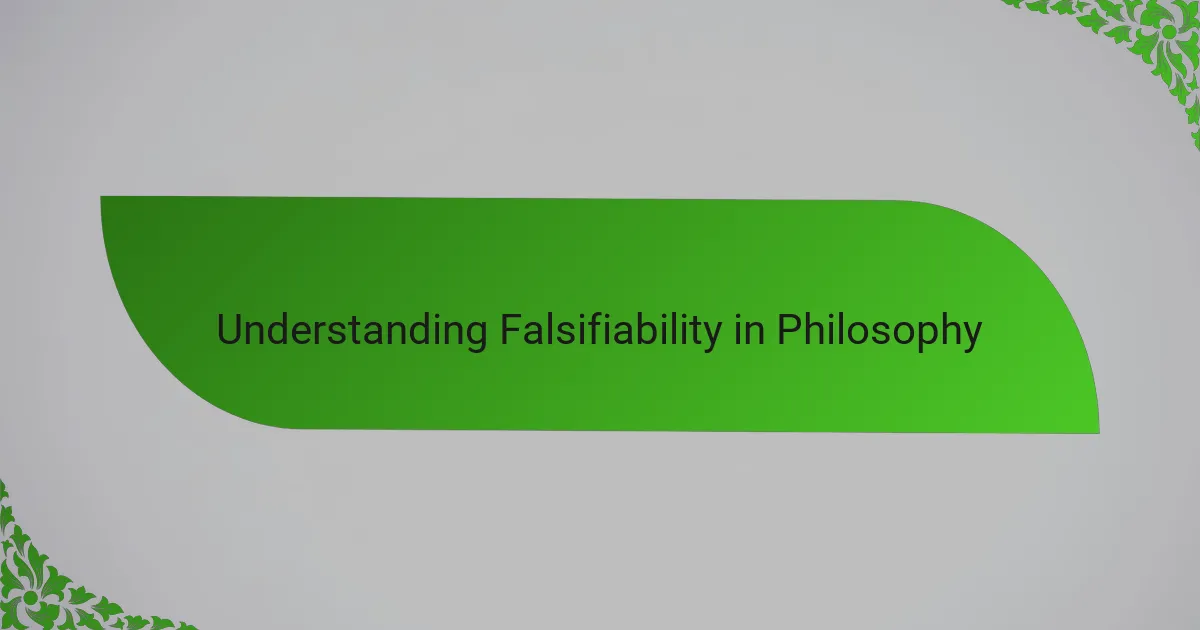
Understanding Falsifiability in Philosophy
Falsifiability, as I see it, is the philosophical litmus test that separates meaningful claims from mere speculation. It asks a simple yet profound question: can my idea be proven wrong? Reflecting on my early studies, I remember how this concept challenged me to think not just about what I believe, but how those beliefs could be tested or refuted.
What struck me most was how falsifiability injects humility into philosophy. Instead of clinging stubbornly to ideas, it encourages openness to revision—a lesson that felt both liberating and, frankly, a little intimidating. Have you ever found yourself holding onto a belief only to realize it couldn’t stand up to questioning? That moment of doubt is where falsifiability comes alive.
In practical terms, understanding falsifiability means recognizing that a theory isn’t scientifically robust unless it can be challenged by evidence. This framework transformed my approach to philosophical inquiry, pushing me to seek clarity and precision. It’s not just about what sounds convincing; it’s about whether a claim survives the tough scrutiny of being disproved.
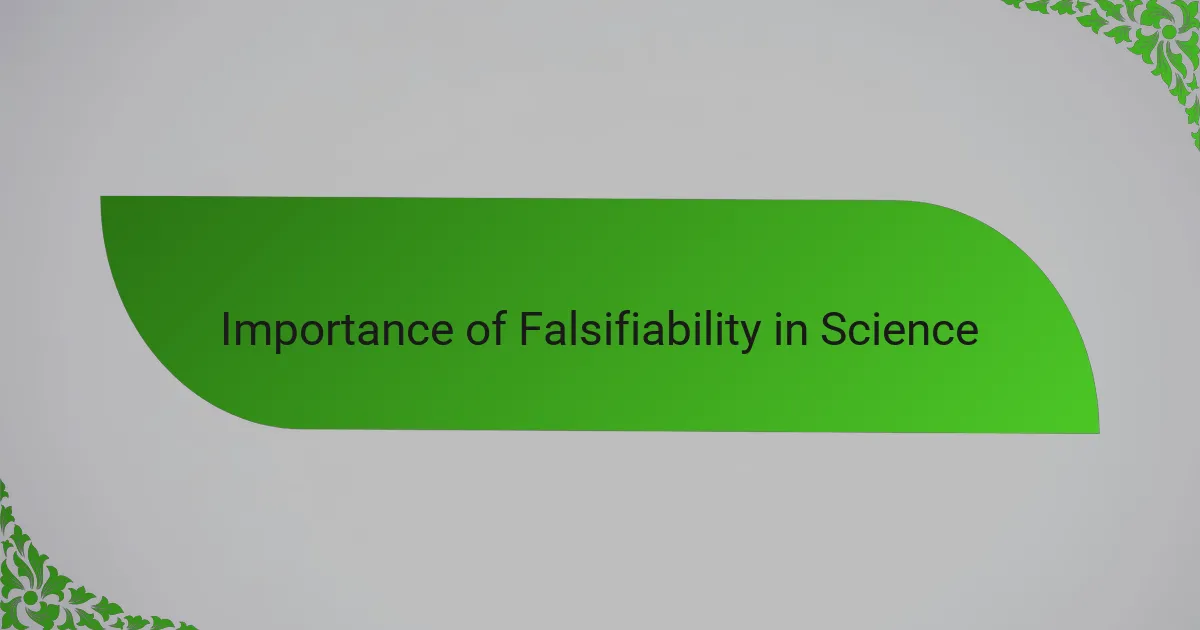
Importance of Falsifiability in Science
Science thrives on the idea that no matter how confident we are in a theory, it must always be open to being proven wrong. When I first grasped this, it felt like science was less about finding absolute truths and more about a rigorous process of trial and error. Isn’t it refreshing to think of knowledge as something fluid rather than fixed?
The importance of falsifiability, as I’ve come to appreciate, lies in its role as a safeguard against dogma. Without it, science would risk becoming a collection of unchallengeable assertions, losing its self-correcting power. I’ve often wondered how many ideas accepted today might crumble tomorrow simply because we dared to test them.
From my experience, falsifiability gives science its credibility and dynamism. It transforms theories from static statements into living hypotheses that invite scrutiny. This mindset turned my curiosity into a more disciplined pursuit—one where asking “Could I be wrong?” became the most exciting question of all.
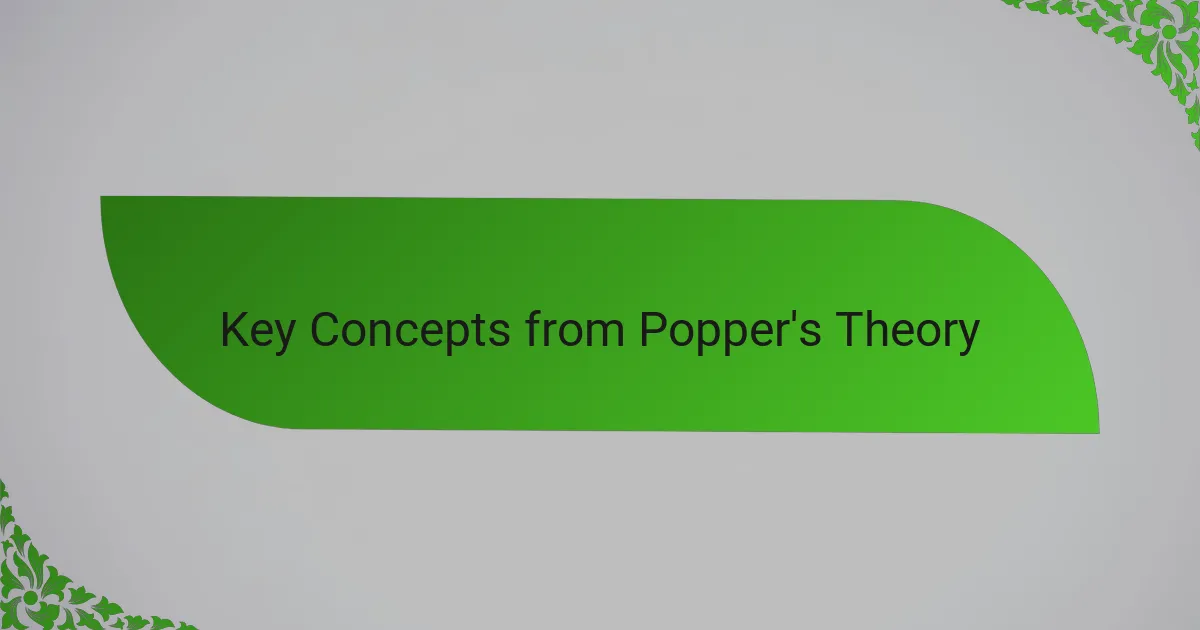
Key Concepts from Popper’s Theory
One of the core ideas Popper emphasizes is that scientific theories must be falsifiable—that is, they must make predictions that can, in principle, be proven wrong. When I first encountered this, it felt like a breath of fresh air; it wasn’t about proving myself right, but about risking being wrong. Doesn’t that shift how we think about knowledge?
Another concept Popper introduced is that science progresses through conjectures and refutations rather than confirmations. I remember the moment this clicked for me—realizing that a theory’s strength lies in its resilience against criticism, not in an accumulation of supportive evidence. It made me appreciate the bravery inherent in proposing bold ideas that invite challenge.
Lastly, Popper’s notion of the demarcation problem—that falsifiability separates science from pseudoscience—gave me a new lens to assess claims I encounter. Have you ever found yourself skeptical of an idea but unsure why? For me, Popper’s criteria provided a practical tool to navigate that uncertainty, making philosophy feel surprisingly relevant to everyday judgment.
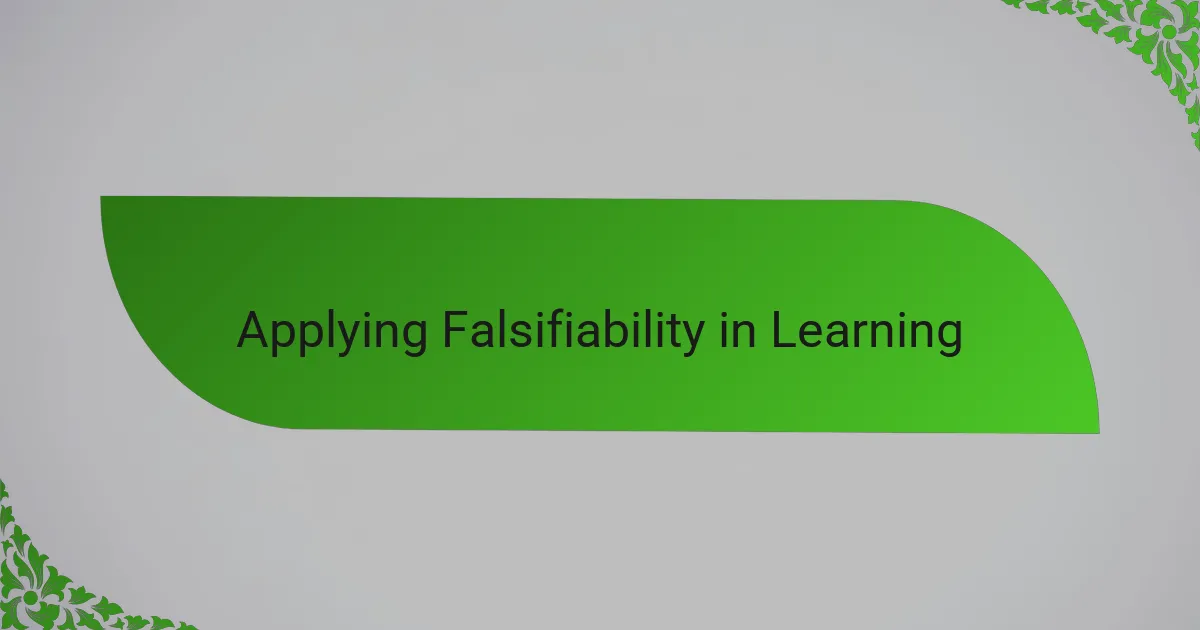
Applying Falsifiability in Learning
When I started applying falsifiability to my own learning, I realized it shifted the way I approached new concepts. Instead of accepting ideas at face value, I began asking myself, “How could this be proven wrong?” That question opened up a space for genuine curiosity rather than passive memorization.
It wasn’t always easy—I sometimes caught myself clinging to comfortable beliefs, even when they failed the test of falsifiability. But recognizing those moments felt empowering. It taught me that being wrong isn’t a setback; it’s an essential part of refining my understanding and growing intellectually.
Have you ever found that embracing falsifiability changed your engagement with difficult material? For me, it transformed learning from a one-way transfer of facts into an active dialogue with ideas, where every claim becomes a challenge waiting to be explored or dismantled.
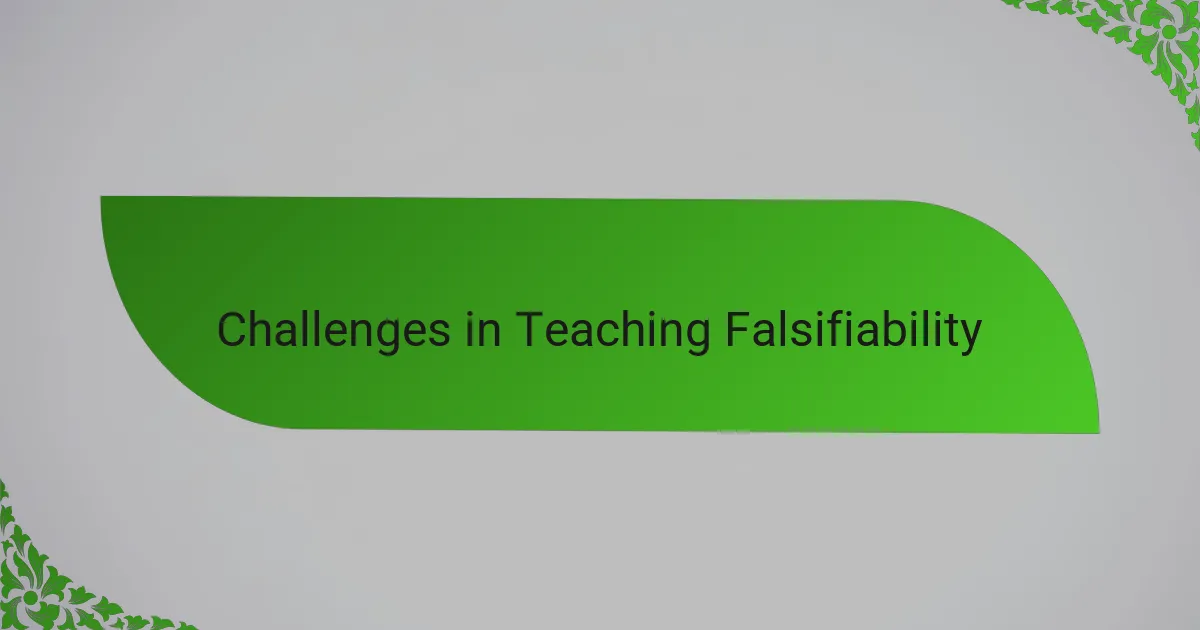
Challenges in Teaching Falsifiability
Teaching falsifiability has its own set of hurdles. I remember struggling to convey how demanding it can be to constantly question one’s own beliefs, especially when students are used to seeking certainty. How do you encourage someone to embrace uncertainty without feeling lost? That tension often makes the concept feel more abstract than practical.
One challenge I consistently face is helping learners grasp that falsifiability isn’t just about finding flaws but about opening a door to deeper understanding. When I first tried explaining this, I noticed students fixating on “proving wrong” as a negative rather than as a constructive step. Changing that mindset felt like trying to turn a ship—it takes patience and persistent examples.
Moreover, I’ve seen how the complexity of real-world claims can muddy the waters. Unlike simple hypotheses, many philosophical ideas are nuanced and layered, making their falsifiability less obvious. Have you ever encountered a theory that seems impossible to pin down with a straightforward test? Navigating that ambiguity is where the teaching really demands creativity and care.
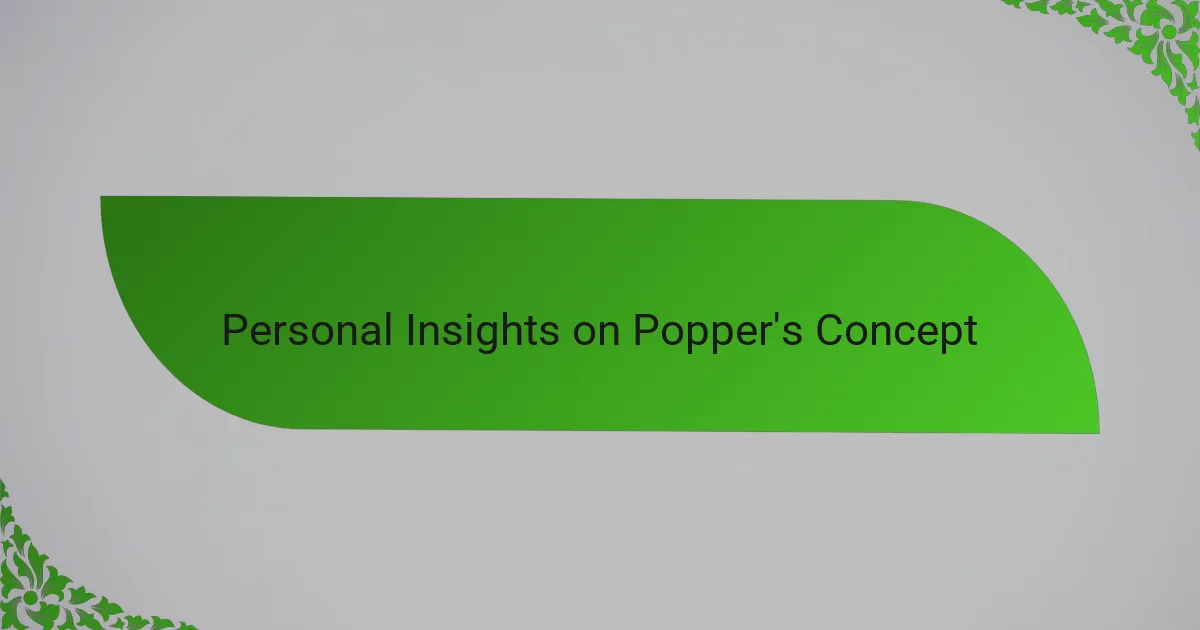
Personal Insights on Popper’s Concept
Popper’s insistence that falsifiability invites risk struck a chord with me early on. It’s not just about boldly stating a claim but about daring to have it disproven. I think that willingness to be vulnerable is what gives philosophy its real power—don’t you find it refreshing when a thinker embraces uncertainty with such honesty?
What I appreciate most about Popper’s concept is how it transforms doubts from obstacles into opportunities. Instead of fearing being wrong, I learned to see each failed test as a stepping stone toward clearer insight. Have you ever felt that moment of disappointment flip into a spark of motivation? That’s where Popper’s falsifiability feels alive and deeply personal.
At times, I’ve wrestled with the idea that a theory must risk being falsified to be meaningful. It felt almost counterintuitive, like putting your beliefs on trial—and not everyone wants that kind of accountability. Yet, reflecting on those moments, I realize it’s precisely this critical stance that keeps philosophy honest and vibrant, pushing me to grow rather than settle.
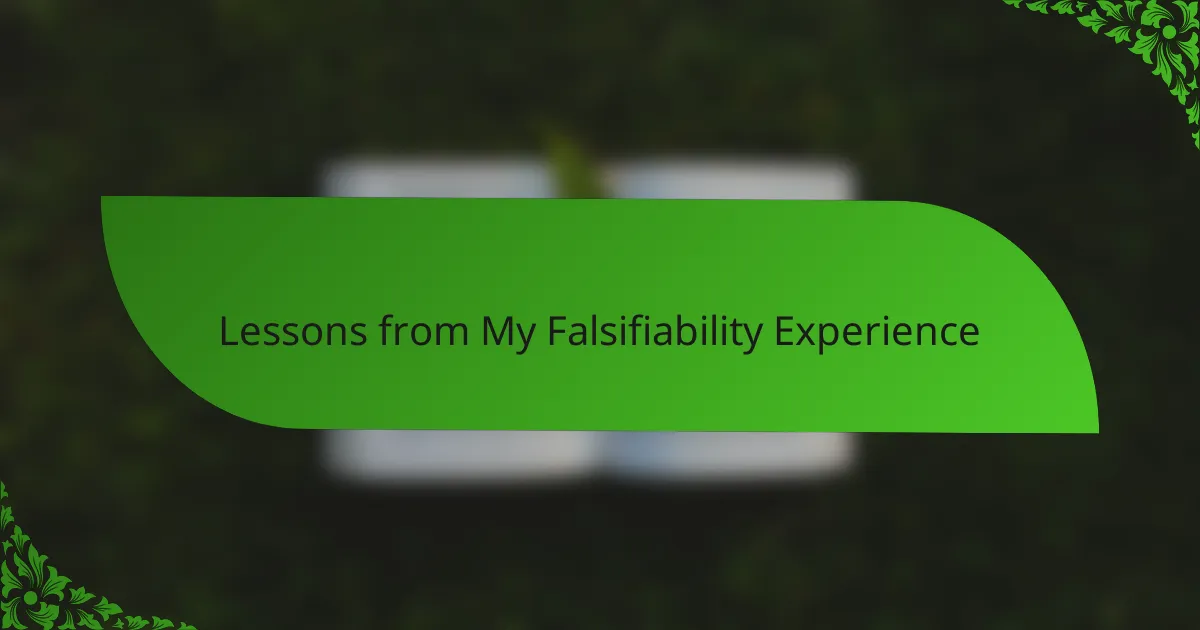
Lessons from My Falsifiability Experience
One lesson I carry with me from my experience with falsifiability is the importance of embracing uncertainty. It’s not easy to admit that our most cherished ideas might be wrong, yet that very admission opened the door to deeper understanding for me. Have you ever noticed how holding onto certainty can sometimes feel more like a prison than a refuge? Letting go of that gave me intellectual freedom.
Another insight was realizing that falsifiability reshapes the way I approach debates and discussions. Instead of trying to “win” by defending a belief at all costs, I started listening more and questioning my own position first. This shift made conversations feel less like battles and more like collaborative explorations, a change that made philosophy feel more alive and accessible.
Finally, I learned that falsifiability is a tool not just for philosophy or science, but for everyday life. Whenever I faced decisions or claims, asking “Could this be proven wrong?” helped me cut through assumptions and focus on what really matters. Isn’t it empowering to have a mental framework that guides you toward clarity amid complexity? For me, that’s the enduring gift of Popper’s idea.